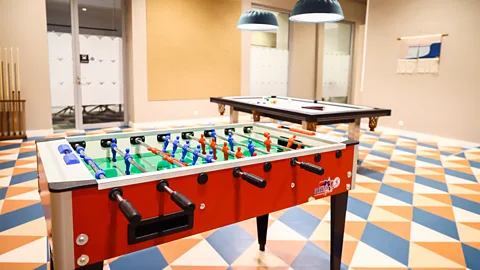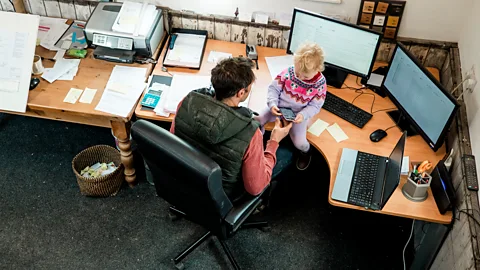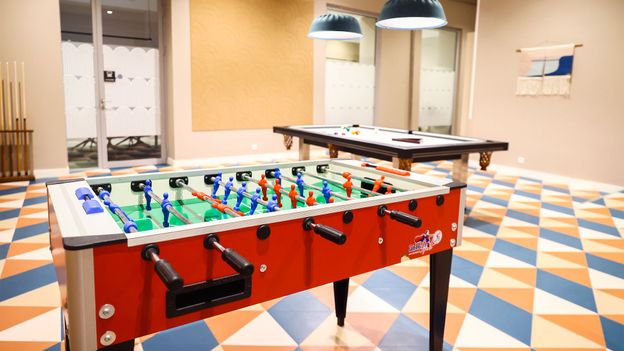March 1, 2024
By Lillian Stone, Features Reporter
 Getty Images
Getty Images
Offices with amenities that once attracted workers are no longer suited to the post-pandemic lifestyle (Photo credit: Getty Images)
While companies are desperate to restore pre-pandemic perks and a sense of “family,” employees want something more tangible.
As many employers lure employees back to the office in an attempt to recreate the pre-pandemic work environment, along with filling seats, they're also looking to revive another relic: office culture.
Before 2020, office culture was synonymous with the “cool” office: places to hang out, stocked pantries, all-out in-office happy hours, or lavish retreats and team-building exercises aimed at fostering a sense of “family.” In years past, these perks attracted many workers to the office. In some cases, entire companies defined themselves by their office culture.
The world of work looks and feels very different than it did just a few years ago, but many businesses are still keen to recreate the office culture that employees left behind when they left their desks in 2020. While these companies are making moves to adapt, such as redesigning spaces to suit new preferences and hybrid work habits, many are still fixated on bringing back what attracted employees pre-pandemic.
But many employees simply aren't interested in backing down. Instead of Trustfall and cold draft beer, they're demanding flexible working arrangements, fair wages, and a focus on humanity in the workplace — perks that go far beyond what they would have expected just a few years ago.
Georgina Fraser, head of talent at global commercial real estate firm CBRE, says the shift in worker priorities is a natural consequence of the coronavirus pandemic. “The pandemic has given us autonomy that we've never had before,” she says. “It's given us the opportunity to determine our own work schedules.”
 Getty Images
Getty Images
Flexibility, personal support and remote working will become much more important to employees in a post-pandemic world (Credit: Getty Images)
And now that workers have experienced that level of work-life balance, they're not likely to settle for anything less. Fraser adds: “Post-pandemic, we've seen a resurgence in people being vocal about what they want and need, not just from office culture but from the wider world.”
Workers now “unashamedly want to be seen as whole human beings, and that extends to their physical location, how[employers]manage them, what support they get, and how[employers]integrate technology between home and the office to support them,” she says.
One big factor in this change in attitude is that many employees feel that office culture simply doesn't apply in a remote and hybrid-first world, where a physical office feels unnecessary. Now that the workplace no longer serves as the cultural hub it once did, “businesses are really struggling to redefine the role of the office,” says Louis Beck, European workplace lead at CBRE. Office culture that was once intended to excite employees doesn't have the same appeal when a workplace only has a third of its employees.
Additionally, workers interested in or required to work in an office are not looking for many of the perks that defined the culture before 2020. This is especially true for younger employees.
I've heard about the infamous “fun” office activities – the cool breakout areas, the ping pong tables, etc. – but I've never been enthusiastically intrigued by them. – Jamie Masterson
“We call Gen Z the 'activist generation,' and they're demanding more responsibility,” Fraser said, pointing to amenities like gender-neutral restrooms, eco-friendly snack options, and office spaces that create more opportunities for community building. She also noted that “whereas before the pandemic, people came in[more strictly]focused on work, there's now an increased expectation for non-work-related moments.”
Additionally, as younger people make up an increasing proportion of the workforce, they are not only less interested in the office culture of the past, but they have never experienced it.
“I don't know of an office culture without remote working,” says Jamie Masterson, 24, a digital marketing professional who started working in the US during the COVID-19 pandemic in 2021. “I've heard of the infamous 'fun' office activities – cool break areas, ping pong tables, etc. – but I've never been enthusiastically intrigued by them.”
Masterson is interested in tangible benefits like pay, healthcare and flexible time off. “People can take time off in their own way and network in their own way. In this time when people are in crisis, when the country is in crisis, it feels a little outdated that[workplace perks]are considered 'perks' compared to things that are actually beneficial, which are financial.”
And with workers more concerned about their financial security and well-being after years of relentless mass layoffs, the focus on office culture may feel especially surreal for workers like Masterson.
Ultimately, there's nothing wrong with fun office perks, but if companies can't back them up with tangible benefits that improve employees' lives, they could be missing out on top talent. “The next generation is more comfortable asserting their needs,” says Juan Franco, 32, an associate director of operations at a higher education institution. “And if companies can't accommodate their needs, they can't expect to keep employees happy.”
Masterson agrees: “Culture is great, of course, but at the end of the day, we all have to survive.”


